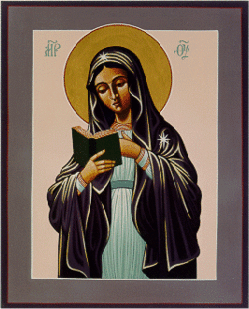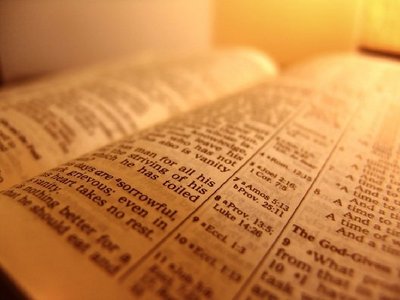 Years ago, a friend gave me a holy card with an unusual depiction of the Blessed Mother. She is visibly pregnant, and reading from a book – praying from scripture. As my friend explained to me: it’s a great image for a writer. It shows Mary reading the word, while carrying The Word. The Word is within, and without.
Years ago, a friend gave me a holy card with an unusual depiction of the Blessed Mother. She is visibly pregnant, and reading from a book – praying from scripture. As my friend explained to me: it’s a great image for a writer. It shows Mary reading the word, while carrying The Word. The Word is within, and without.
When I was in formation, studying to become a deacon, I taped that image inside my binder, and it was always with me when I went to class. Later, when I gave my first homily at St. Josephat’s in Bayside, I was surprised to see a similar image in a stained glass window near the altar. It depicts the Annunciation, with Mary once again reading an open book at the moment of conception. It shows Mary’s great devotion to the word, in every manifestation.
I thought of that image again when I read over this evening’s gospel. It’s one of the more challenging passages in scripture. I imagine a lot of people hear this reading from Luke, as we’re about to celebrate one of the great Marian feasts, the Assumption, and are taken aback. A woman in the crowd calls out, praising the womb that bore him and the breasts that nursed him. But then Jesus seems to change the subject.
“Rather,” he replies, “blessed are those who hear the word of God and observe it.”
This hardly sounds like high praise for the Blessed Mother. But that’s exactly what it is.
He is talking about the woman who heard the word, who read the word, who observed the word, and who carried the Word – and who responded at every moment of her life with a word of her own: “Yes.”
And if you want to dissect this scripture passage even further, I think it comes down to this: Mary’s sanctity was more than a matter of biology. It was much more than her physical reality. Making the Word incarnate involved than just shared DNA.
No. It was a matter of faith.
And: as it was with Mary, so it can also be with us.
Henri Nouwen, I think, understood that. He was a Dutch priest, scholar, and academic who taught at Yale and Harvard for several years in the 1970s and ’80s. But Nouwen felt called by God to do something else with his life. He struggled with it, and prayed over it, for many years, and finally found the answer with the group L’arche, founded by the great Canadian, Jean Vanier. L’arche cares for the mentally and developmentally disabled. And so it was that Henri Nouwen, this deep-thinking writer and intellectual, spent the last years of his life bathing those who could not bathe themselves, feeding them, celebrating the sacraments with them, and seeing in them the beautiful face of Christ.
I think Henri Nouwen, in many ways, also “heard the word of God and observed it.” And I think he also felt a profound connection to Mary’s simplicity and humanity. In one of his journals, he describes meeting a priest who summed up Mary’s meaning to the world so beautifully. “To look at Mary,” this priest said, “is to see God’s original plan for humanity.” As Nouwen explained, “In her, we see the way God wanted us to be…Mary shows us how to receive the marvelous gift of God’s love, and how to respond to God’s redemptive action in our lives.”
Looked at that way, I think the Assumption takes on an even deeper meaning.
If Mary does indeed show us “God’s original plan for humanity,” so does her glorious Assumption. In the Assumption, preserved forever before the face of God, freed from the corruption of the grave, Mary not only fulfills her great destiny – but also offers us a beautiful glimpse of our own. This is what God wants for us. This is what He dreams for us. This is His desire and design for the world.
The Assumption offers us that promise – and that hope.
Our prayer on the eve of this feast is to be worthy of it, to model ourselves on the Mother of God – in all her holiness, in all her humility. It means saying “Yes” to God and working, as Jesus said, “to hear the word of God and observe it.” That means, very simply, to live it. To embrace it. To desire, like Mary, to bring the Word into the world.
It has nothing to do with biology, or DNA.
It is everything to do with trust. With love. With obedience.
And, as I said before, it is all a matter of faith.
As Henri Nouwen once put it so beautifully: “A faith in him who became flesh in her, a faith that makes it possible for him to become flesh in us, too.”

